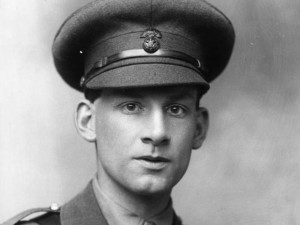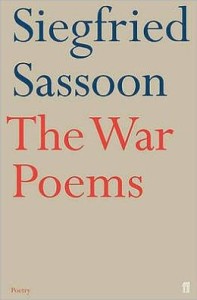Siegfried Sassoon (1886-1967) might have become “THE” war poet of the group of war poets associated with World War I. He was a published poet before the war story and was well known in poetry circles. He was an officer decorated with the Military Cross for bravery and heroism during the war. The men who served under him loved him for his leadership style (he cared about them). And he survived the war.

Sassoon wrote poems throughout the war. Most were published in poetry collections; some were published in newspapers and journals. All of them have been collected and published over the years in various editions as The War Poems; the original was published in 1919.
My edition was arranged and first published by Rupert Hart-Davis in 1983, and republished in 2012. The poems are arranged chronologically, and occasional footnotes provided additional background when it’s available (like when a particular poem was written, when it was published, and what was going on at the time).
The poems, like those of most of the war poets, begin patriotically. Sassoon’s, however, change. He began losing close friends, some of whom he cared deeply for, and he had first-hand experienced with what happens when generals don’t know quite what they’re doing.
Here is a poem written six days before the Battle of the Somme in 1916. The rumors of an attack were in the air, and the soldiers were expecting it to begin at any time.
Before the Battle
Music of whispering trees
Hushed by a broad-winged breeze
Where shaken water gleams;
And evening radiance falling
With reedy bird-notes calling.
O bear me safe through dark, you low-voiced streams.
I have no need to pray
That fear may pass away;
I scorn the growl and rumble of the fight
That summons me from cool
Silence of marsh and pool
And yellow lilies is landed in light
O river of stars and shadows, lead me through the night.

“Swept away” may be too mild a phrase for what actually happened. The Battle of the Somme began on a 50-mile front on July 1, 1916, and lasted until Nov. 18. The British suffered 58, 000 deaths, one third of them occurring on the first day of battle.
The next year, Sassoon, a military hero, wrote his famous letter against the war. The reaction was swift and predictable, and he was packed off to Scotland for hospitalization. There he met Wilfred Owen, who idolized Sassoon and his poetry. For the few months they were together there, Sassoon encouraged Own to continue writing and improving his poems. Years later, it would Sassoon who would have much to do with promoting the dead Owen’s poetry. An Owen manuscript with edits and suggestion by Sassoon is currently on display in the First World War Exhibition of the Imperial War Museum in London.
After the war, Sassoon continued to write poetry, with some 28 collections published during his lifetime. He also wrote memoirs, fiction, essays and biography. As he grew older, he dismissed his war poems and rarely mentioned them; it was as if he wanted to leave all that was lost in the past.
In 1985, Sassoon was one of 16 of the war poets who was memorialized with a stone in Westminster Abbey’s Poet’s Corner.
Photo by Gordon Robinson, Creative Commons via Flickr. Post by Glynn Young, author of the novels Dancing Priest and A Light Shining, and Poetry at Work.
Want to brighten your morning coffee?
Subscribe to Every Day Poems and find some beauty in your inbox.
- “Your Accent! You Can’t Be from New Orleans!” - October 9, 2025
- Poets and Poems: Donna Vorreyer and “Unrivered” - October 7, 2025
- Poet Sidney Lanier and the Lost Cause - October 2, 2025

Darrelyn Saloom says
Interesting post, Glynn. And so sad that once he wrote a letter against the war, he was shipped off to a hospital. Who better to write about battle than a poet and war hero?
Glynn says
The war was marked on the Allied side by a considerable amount of leadership incompetence. The price was paid in soldiers’ deaths. few knew that better than Sassoon. He was famous for, among other things, taking a German trench singlehandedly. That’s why his letter bit so deeply.
Maureen Doallas says
I’ve enjoyed this fine series on WWI poets, Glynn. It’s great to see the reissues of the poetry as part of this year’s commemoration of the start of the war.
My friend poet John Siddique included in his marvelous collection “Full Blood” two poems, both called “One Hundred” but one of which comprised the fragments of names of soldiers killed in the Iraq-Afghanistan wars (fragments because their full names were never logged by the Defence Ministry). Had he read aloud that latter poem in the UK he could have been convicted of treason. (He, of course, has not recorded it.) I wrote a post about the issue (“Monday Muse on the ‘One Hundred’ Poems”, 8/15/11). Unfortunately, what happened to Sassoon can still happen today.
I read recently that an estimated half-a-million men who served in WWI were diagnosed with what today would be described as PTSD.
Glynn says
Maureen, thanks for the comment. What we know today as PTSD was called shell shock in WWI and WWII, as you point out. My own father served in WWII, and he would rarely talk about it, even when pushed.